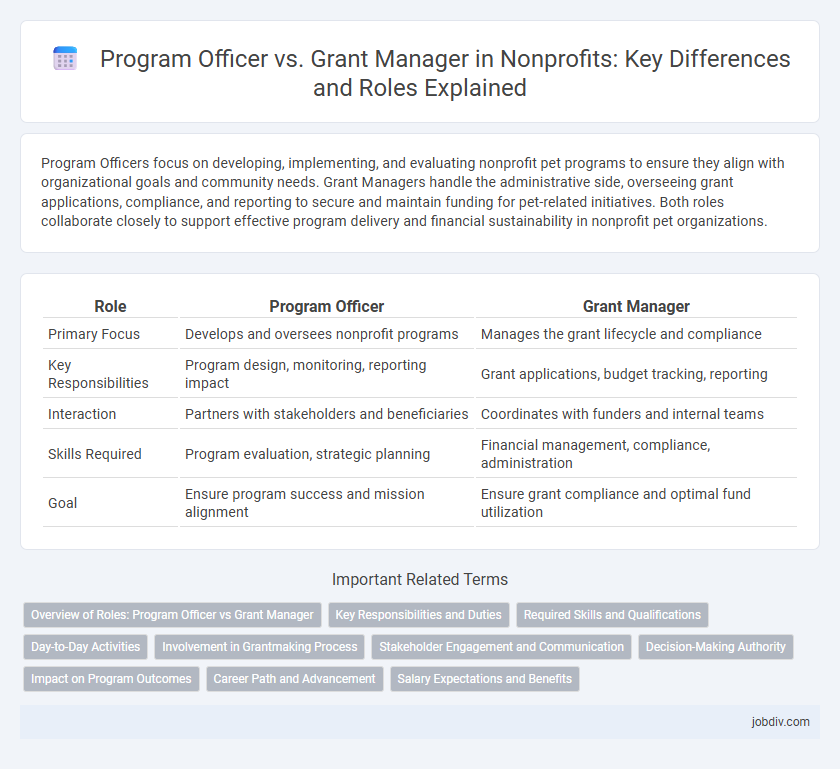Program Officers focus on developing, implementing, and evaluating nonprofit pet programs to ensure they align with organizational goals and community needs. Grant Managers handle the administrative side, overseeing grant applications, compliance, and reporting to secure and maintain funding for pet-related initiatives. Both roles collaborate closely to support effective program delivery and financial sustainability in nonprofit pet organizations.
Table of Comparison
| Role | Program Officer | Grant Manager |
|---|---|---|
| Primary Focus | Develops and oversees nonprofit programs | Manages the grant lifecycle and compliance |
| Key Responsibilities | Program design, monitoring, reporting impact | Grant applications, budget tracking, reporting |
| Interaction | Partners with stakeholders and beneficiaries | Coordinates with funders and internal teams |
| Skills Required | Program evaluation, strategic planning | Financial management, compliance, administration |
| Goal | Ensure program success and mission alignment | Ensure grant compliance and optimal fund utilization |
Overview of Roles: Program Officer vs Grant Manager
Program Officers primarily develop and oversee nonprofit programs, ensuring alignment with the organization's mission while managing partnerships and strategic initiatives. Grant Managers focus on the entire grant lifecycle, including proposal development, compliance monitoring, and financial reporting to secure and maintain funding. Both roles are essential for nonprofit success, with Program Officers driving program impact and Grant Managers ensuring effective fund administration.
Key Responsibilities and Duties
Program Officers oversee the planning, implementation, and evaluation of nonprofit programs, ensuring alignment with organizational goals and community needs. Grant Managers focus on administering grant processes, including proposal development, compliance monitoring, and reporting to funders. Both roles require strong project management and communication skills but differ in emphasis on strategic program oversight versus financial and regulatory grant stewardship.
Required Skills and Qualifications
Program Officers require strong project management, strategic planning, and stakeholder engagement skills to design and oversee nonprofit initiatives effectively. Grant Managers must possess expertise in grant writing, compliance monitoring, budget management, and reporting to ensure successful funding acquisition and administration. Both roles demand excellent communication, analytical abilities, and a solid understanding of nonprofit funding mechanisms.
Day-to-Day Activities
Program Officers typically focus on designing, implementing, and evaluating nonprofit initiatives, including stakeholder engagement and impact assessment. Grant Managers handle the administration of grant funds, ensuring compliance with funding requirements, tracking expenditures, and preparing financial reports. Both roles require strong organizational skills, but Program Officers emphasize strategic program development while Grant Managers concentrate on grant lifecycle management.
Involvement in Grantmaking Process
A Program Officer actively shapes the grantmaking process by identifying priority areas, developing funding strategies, and evaluating potential projects to align with the nonprofit's mission. In contrast, a Grant Manager focuses on the administrative aspects, such as managing application workflows, tracking compliance, and ensuring timely disbursements. Both roles are critical, but Program Officers drive strategic decision-making while Grant Managers ensure operational efficiency in grant execution.
Stakeholder Engagement and Communication
Program Officers prioritize relationship building with community partners and beneficiaries to align programs with stakeholder needs, ensuring transparent and impactful communication. Grant Managers concentrate on liaising with funders and internal teams to manage compliance, reporting deadlines, and precise grant documentation. Both roles require strategic communication skills, but Program Officers focus more on external stakeholder collaboration, while Grant Managers emphasize formal communication channels for grant stewardship.
Decision-Making Authority
Program Officers typically hold greater decision-making authority in nonprofits, overseeing the strategic direction and approval of grant proposals based on program goals and impact potential. Grant Managers focus on the administrative and compliance aspects, ensuring grant agreements are executed properly but with limited authority on funding decisions. The distinction in decision-making power directly affects how nonprofits allocate resources and manage stakeholder relationships.
Impact on Program Outcomes
Program Officers drive strategic direction and partnerships that enhance program effectiveness and long-term impact in nonprofits. Grant Managers ensure compliance, financial oversight, and timely reporting, supporting smooth operations that allow programs to meet their goals efficiently. Strong collaboration between these roles maximizes resource allocation and improves overall program outcomes.
Career Path and Advancement
Program Officers typically focus on designing, implementing, and evaluating nonprofit programs, positioning themselves for advancement into senior leadership roles such as Program Director or Executive Director by gaining expertise in strategic planning and stakeholder engagement. Grant Managers specialize in overseeing the grant application process, compliance, and fund distribution, making them ideal candidates for advancement into roles like Director of Grants or Development Manager through mastery of financial management and donor relations. Both career paths offer opportunities for progression, but Program Officers often advance through program impact leadership, whereas Grant Managers progress via financial stewardship and resource mobilization.
Salary Expectations and Benefits
Program Officers in nonprofits typically earn between $60,000 and $85,000 annually, reflecting their strategic roles in program development and stakeholder engagement. Grant Managers often have salaries ranging from $55,000 to $75,000, emphasizing their expertise in grant compliance and financial reporting. Benefits for both positions frequently include health insurance, retirement plans, and professional development opportunities, with variations depending on organizational size and funding.
Program Officer vs Grant Manager Infographic

 jobdiv.com
jobdiv.com